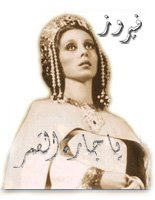
1 اغاني نادره
http://rapidshare.com/files/158731992/Oghneyat_Sha3at.rar
Fairuz is a remarkably popular Lebanese musician who has managed to sustain Lebanese cultural motifs and aspirations while blending her performances with sounds as diverse as Mozart and Latin American rumbas, flamenco and Balkan folk music. Fairuz, who is Christian, has recorded both hymns and pro-Palestinian sings. The curious can hear her sing on Al-Gomma al-Hazeenah. ~ Leon Jackson, All Music Guide

Christmas Hymns
Even though Christmas is months away, the album gets you in the spirit of the holidays. I am sitting here anticipating snow to come falling. Or Santa to come down the chimney, even though there's no chimney.Unlike many other albums, all the songs on this album have the same theme, Christmas. What a revelation huh? Anyway from the introductory church bells through the other hymns and finally with church bells again, it's all about Christmas. And like Christmas it's ends fast.In the booklet, there are a number of photos taken from a television show.
All Songs are traditional.Lyrics and arrangments made by The Rahbani Brothers.
Album tracks:
1. Carillons 1'
2. Sawt El Eid (Silent Night) 2'40"
3. Laylet Eid (Jingle Bells) 2'51"
5. Najmet Eid (Les Anges Dans Nos Campagnes) 2'57"
download all tracks in 30-11-08

 Yes'ed Sabahak
Yes'ed Sabahak  Houmoum El hob
Houmoum El hob ana wsahrani
ana wsahrani




 While the the story could have been developed into an entire play, the Rahbani Brothers opted to use it as a premise to present their songs. It contains no dialogue and the story is told through the first couple of songs and some narrated text. The booklet contains no information but it's safe to say that the first twelve tracks are of AlBaalbakiya while the other twelve are of Return of the Soldiers. The play itself is great to listen to, I only wish they would have wrote more on the gods and the destruction of Baalbeck, and that how it started is how it would have ended.
While the the story could have been developed into an entire play, the Rahbani Brothers opted to use it as a premise to present their songs. It contains no dialogue and the story is told through the first couple of songs and some narrated text. The booklet contains no information but it's safe to say that the first twelve tracks are of AlBaalbakiya while the other twelve are of Return of the Soldiers. The play itself is great to listen to, I only wish they would have wrote more on the gods and the destruction of Baalbeck, and that how it started is how it would have ended.
Live At Beiteddine 2000 This is the latest release by Fairuz. But it's more than that. It is everything. Who is Fairuz? Fairuz is my link. She is the one who always extends a hand in the worst days of my mental isolation. She is more than that. She exists within the cells of my brain. And in the worst days of religious confusion, God tells me, look there you spoiled creature, I created Fairuz. I listen to her and I stop whining.
All Songs were written by: Ziad Rahbani expect:La Inta Habibi, Btitloj Edenii, Ya Mahla Layli and Nassam Alayna by Rahbani brothers. Ahu Dalli Sar by Badih Khairi and Sayed Darwish. Lyrics of Habbaytak Tnseet Enoum by Joseph Harb.Arranged by Ziad Rahbani. Released in February 2001.
Album tracks:
8. The National Lebanese Resistance 3'22"
13. Ya Mahla Layalil Hawa 3'34"
